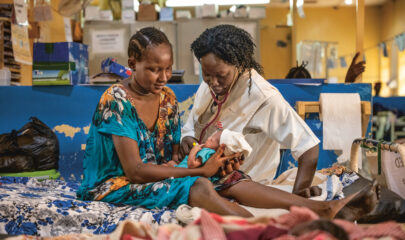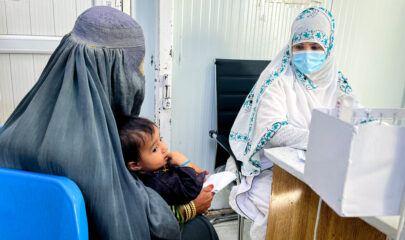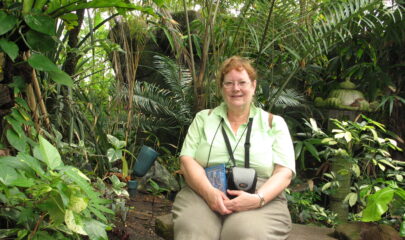The future for female patients and health workers in Afghanistan is uncertain after an order by the Taliban-run administration was issued in December 2022 prohibiting women from working for non- governmental organizations (NGOs).
Though health workers, including Doctors Without Borders/Médecins Sans Frontières (MSF) staff, are currently exempt from the ban, there is no formal assurance they will be able to continue work unhindered. In a context of high dependency on humanitarian and non-governmental support, the participation of female NGO workers in the provision of healthcare services is an absolute necessity.
Women make up more than 51 percent of MSF’s medical staff in Afghanistan. After MSF condemned the Islamic Emirate’s decision in a press release last December, some of the organization’s female employees voiced their frustration and their fears for the future.
AFGHAN WOMEN SPEAK OUT
“In the hospital, we have lots of patients who are women. When they fall sick or need to deliver a child, they must have a place to go. If the Taliban prevents female staff from working, no one will be able to take care of them,” says Farzaneh*, an MSF Afghan female employee.
“A woman’s health affects the health of her whole family: if there is no access to prenatal and postnatal services, children’s lives will be put at risk as well. This ban will not affect just women. It will affect the country.”
“It is difficult to know we are something less.”
Another MSF staff member says, “If this ban is extended to health workers, then things will be very difficult for female patients as well. Many families will not accept women to be treated by men. All of this can harm Afghan women in several ways, including by an increase in maternal and infant mortality.”
The Islamic Emirate’s ban compounds a dire social and economic situation in a country devastated by unemployment and sanctions imposed by foreign governments.
“I provide for seven people in my family. If I become unemployed, no one will be able to support my family,” says Benesh, another MSF female worker from Afghanistan. “Many women in Afghanistan are the breadwinners for their families because the men are unable to work, have fled the country or have died. Every day I think a lot about what I would do if I were not allowed to work anymore.”
Women and children are among the groups most vulnerable in Afghanistan, and the concerns raised by MSF’s female staff members echo those of other Afghan women.

“The recent ban has already caused psychological problems for many women and their families,” says an Afghan woman. “We fear that every day at work can be our last. Getting to offices seems more and more difficult.”
“I would also like to say one thing to people who might be reading this: Please do not forget the women in Afghanistan.”
“Already I see that the people at checkpoints look for any excuse to prevent women from moving freely. For example, my sister was sick recently and when she was travelling to our hospital for a check-up, they did not allow her to go because she didn’t have a mahram [escort]. She stood there for about 50 minutes, outside in the cold. Then my brother came, and they allowed them to leave. It is difficult to know we are something less.”
“I would also like to say one thing to peo- ple who might be reading this: Please do not forget the women in Afghanistan,” says Soraya, another Afghan female staff. “No society can do well without both women and men. We all need to be involved in our communities to make things better.”
*All names have been changed to protect identity.

© Oriane Zerah


